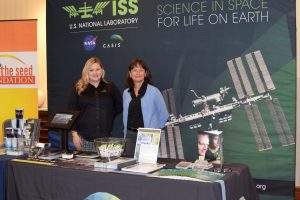 There’s a good bet that the American Seed Trade Association (ASTA) annual meeting of 30 years ago looked remarkably different than the event that took place last week in Minneapolis, MN. And it’s a good bet that the science and technology making an impact on the industry in another 30 years may not have even been thought of yet, but it’s those careers, those innovations that drive the education program of CASIS.
There’s a good bet that the American Seed Trade Association (ASTA) annual meeting of 30 years ago looked remarkably different than the event that took place last week in Minneapolis, MN. And it’s a good bet that the science and technology making an impact on the industry in another 30 years may not have even been thought of yet, but it’s those careers, those innovations that drive the education program of CASIS.
CASIS manages the laboratory on the International Space Station on behalf of NASA, making the results of experiments freely available. They also work hand in hand with ASTA and the First- The Seed program to draw students into the importance of growing food through the Tomatosphere curriculum.
Teachers in the U.S. and Canada can receive two packets of seed for their classroom, one that has been into space and one that has not. The classroom then gets to grow, hypothesize, and experiment upon those plants to learn the effects of space on plants.
Naturally, classroom students aren’t the only ones who want to know about the effects of space on our ability to grow food. CASIS is also conducting studies that will have far-reaching implications. They began with the quick-growing plant, arabidopsis, which is the genomic standard for plant research, but now they’re moving beyond.
“We’re ready to expand that and do any other crops because we want to learn things that are going to help earth– maybe make plants grow better here on earth, but also to prepare for that long duration mission going to Mars and who knows where else?” explained Debbie Wells, program manager for CASIS.
Listen to my full interview with Debbie Wells and Samantha Thorstensen to learn more about CASIS and the Tomatosphere program: Interview with Debbie Wells and Samantha Thorstensen, CASIS
